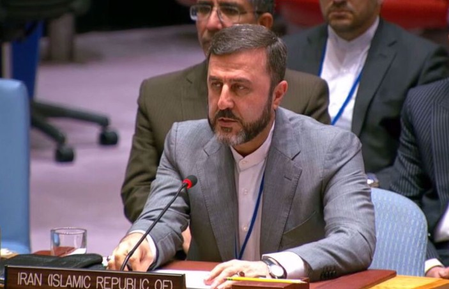
United Nations – Iran has agreed to host a technical delegation from the International Atomic Energy Agency (IAEA) within the next two to three weeks, Iranian Deputy Foreign Minister for Legal and International Affairs, Kazem Gharibabadi, confirmed on Wednesday.
Speaking to reporters, Gharibabadi said the visit would take place “very soon, in two to three weeks,” though clarified that the delegation’s purpose would be to discuss a framework for cooperation, not to inspect nuclear sites. The Atomic Energy Organization of Iran is currently assessing damage to its nuclear facilities.
Gharibabadi emphasized that any future negotiations between Iran and the United States would only occur indirectly, according to reports by the Xinhua news agency.
On Monday, Gharibabadi addressed a special session with the Group of Friends in Defence of the UN Charter, during which he outlined what he described as recent acts of aggression by Israel and the United States. The Iranian Foreign Ministry stated the meeting focused on the impact of these actions on Iran’s nuclear infrastructure and sovereignty.
He also referred to a bill passed by the Iranian Parliament, which mandates a suspension of cooperation with the IAEA unless Iran’s nuclear facilities and personnel are guaranteed safety and security.
“We have agreed to receive the IAEA technical team in Tehran to discuss a cooperation framework,” Gharibabadi said, calling the move a “gesture of goodwill” despite Iran’s dissatisfaction with the agency's current stance.
He expressed hope that the IAEA would respond positively and appreciate Iran’s efforts. However, relations remain strained, particularly under the leadership of IAEA Director General Rafael Grossi. Iran has accused Grossi of relying on allegedly fabricated documents from Israel and failing to condemn U.S.-Israeli attacks on Iran’s nuclear infrastructure.
Reiterating Iran’s nuclear stance, Gharibabadi said the country would continue enriching uranium based on its own needs and dismissed suggestions of a voluntary freeze on enrichment.
“We must have the capability to meet our own requirements. Past experiences show we cannot rely on others to fulfill them,” he said, referring to Western nations’ previous refusal to supply enriched uranium for Iran’s Tehran nuclear research reactor.
On warnings from the UK, France, and Germany—three signatories of the 2015 nuclear deal—regarding the possible activation of the deal’s snapback mechanism to reimpose sanctions, Gharibabadi issued a stern warning.
“They have no legal right to initiate the snapback mechanism. But if they proceed, Iran will not stay passive. We will respond accordingly,” he stated.
When asked about the possibility of Iran withdrawing from the Nuclear Non-Proliferation Treaty (NPT), Gharibabadi said the option remains “on the table” and has been considered by past administrations. While he did not confirm whether a final decision had been made, he noted that “some responses have already been determined.”
With inputs from IANS